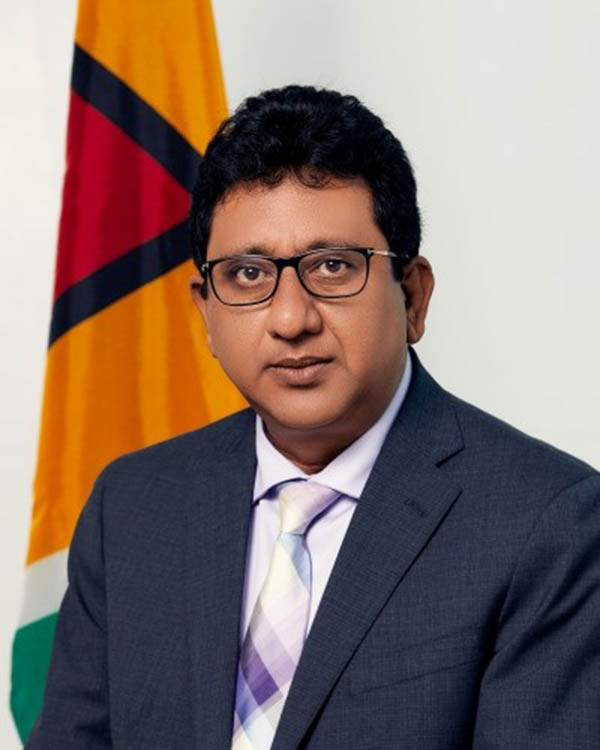By Khamisi Slowe
During his year-end press conference yesterday, Attorney General and Minister of Legal Affairs, Anil Nandlall SC declined to be drawn on the long-stalled confirmation of a Chancellor of the Judiciary and a Chief Justice.
The issue of appointing a substantive Chancellor and Chief Justice has lingered for years, leaving Justices Yonette Cummings-Edwards and Roxane George acting in these positions. When asked by the Sunday Stabroek why President Irfaan Ali has not acted on the opposition’s proposal to confirm these appointments, Nandlall responded, “That’s a presidential decision, and the President will make that decision at the appropriate time. You can ask the President.”
Pressed on whether he had offered any advice to the President, Nandlall said, “I have advised the President that he should choose his candidates carefully. The decision is his, provided that it finds agreement with the Leader of the Opposition.”
Nandlall avoided commenting on whether the acting Chancellor and Chief Justice are strong candidates for confirmation, stating, “I would not want to speak on that. It’s not my place. It’s the President’s decision.”
Despite mounting criticism that the delay undermines judicial stability, the Attorney General denied any personal responsibility for the lack of progress. “No, I don’t consider it a failure,” he said when asked whether this reflected poorly on his position as Leader of the Bar.
Guyana’s constitution requires that the appointments of the Chancellor and Chief Justice be made through mutual agreement between the President and the Leader of the Opposition. This mechanism was designed to ensure bipartisan consensus, given the critical role these offices play in upholding judicial independence and the rule of law.
However, the country has not had a substantive Chancellor since Justice Desiree Bernard’s departure in 2005, and no substantive Chief Justice has been appointed in over a decade. Successive administrations and opposition leaders have struggled to reach agreement on the appointments.
The continued use of acting appointments has drawn criticism from legal and political observers, who argue that it undermines judicial stability and public confidence in the justice system.
President Ali has made a series of excuses for not moving to confirm a Chancellor and CJ. The pressure mounted on him when Opposition Leader Aubrey Norton in a letter dated May 12, 2022, and addressed to Minister of Parliamentary Affairs and Governance Gail Teixeira signalled his intention to agree to confirm the appointment of the two justices. Ali has never responded to this proposal by Norton.
in April of 2023, rejecting an opposition motion that the President was in breach of the constitution on the confirmation of a Chancellor and a CJ, High Court Judge Damone Younge ruled that President Ali must act with “all convenient speed” in ensuring the appointments of a substantive Chancellor and Chief Justice and therefore must also move with swiftness in engaging the Leader of the Opposition as is mandated by the Constitution. She added that the current state of affairs “is a stain to our country’s otherwise richly woven legal tapestry.” Twenty-one months later, there has been no action by the President.
Whistleblowing legislation
The Attorney General was also questioned about the whistleblowing legislation, which is seen as a critical tool in the fight against corruption. Although the legislation has already been passed it remains inactive. On this issue, Nandlall pointed to the Ministry of Home Affairs, saying, “That is where you should direct those particular questions.”
Nandlall also provided an update on the ongoing revision and consolidation of the Laws of Guyana, which was initially slated for completion in 2023 but has been pushed to mid-2025.
“That is ongoing. It was supposed to have been completed, but unfortunately, it’s a lot of work. The deadline I have from the law revision centre is June of next year. So by July, hopefully, we should be launching it,” he explained.
The revision exercise, which covers the years 2012 to 2022, is a collaborative effort between the Law Revision Commission and the Improved Access to Justice in the Caribbean (IMPACT Justice) Project. It is being executed by the Regional Law Revision Centre Inc, based in Anguilla. Nandlall emphasised that the company is the only one in the region capable of carrying out this type of work.
The last revision of Guyana’s laws was carried out in 2012. For the current exercise, the Attorney General’s Chambers, through the IMPACT Justice Project, is providing the revision centre with a range of documents, including: electronic and printed copies of the 2012 Revised Edition of the Laws of Guyana; a consolidated index of the laws for the revision periods 2009, 2010, and 2021; and Gazette publications for the period December 31, 2010, to December 31, 2021.
